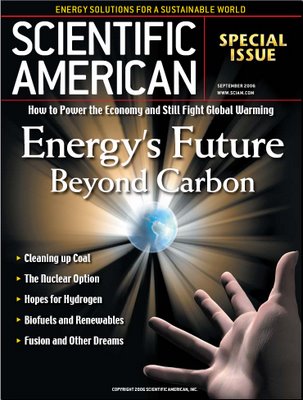Here's some of the articles from the table of contents
A Climate Repair Manual
A Plan to Keep Carbon in Check
Fueling Our Transportation Future
An Efficient Solution
What to Do about Coal
The Nuclear Option
The Rise of Renewable Energy
High Hopes for Hydrogen
Plan B for Energy
The bottom line in all the articles that I've read is that we need to do something to change our energy usage, and we need to do it now.
 You can read some of the articles online at www.sciam.com
You can read some of the articles online at www.sciam.com
3 comments:
I have to say the editors are revealing their ignorance. The headline "Energy's Future - Beyond Carbon" seemingly contradicts the highlighted article about Biofuels. The vast majority of life on earth is carbon based, as are fuels derived from them (including the world's most widely used biofuel - oil).
I'll take a look at the articles if this issue survives redirection.
You are right that biofuels are carbon based, but I think the intent of the headline is in regard to carbon emissions. Calling oil a biofuel is a misuse the term biofuel. Biofuels are used to describe renewable fuels from biomass. It is true that oil forms from decaying organic material over the course of millions of years and therefore is bio-derived, but that is not the intent of the term biofuel. You could just as easily say oil is a form of solar energy because all plants derive energy from the sun, but again that would simply be a misuse of the term.
If the headline were moving "Beyond Carbon Emissions" It would still be inaccurate. Any combustion yields CO2. Burn a biofuel, and you produce CO2+h20. That's high school chemistry. Will Ethanol produce more energy per emitted mole of CO2 than a long chain carbon? I'm not convinced, but I haven't run the numbers. I think C-C bonds have more energy that C-H and certainly more than O-H.
I just imagine the editors sitting around trying to come up with a new headline because "Moving beyond Oil" has been done to death and oil prices were slipping. They looked for a technical synonym and got suckered into an embarrassing group think.
I disagree with your analogy to solar energy. The term solar energy is well defined as the energy that is taken directly from photons. Once the photon feeds the plants, or warms the wind the solar energy is transformed into biological or mechanical energy.
Biofuels are obtained from processing dead, or dying biomatter. (Unless the article, which I have not read, advocates powering personal vehicles with banks of hamster wheels)
Oil is obtained from biomatter via a chemical process. Just like ethanol is from corn. More oil is being created right now, at this moment, all over the world. The only difference in renew ability of crude oil and ethanol stocks is in the kinetics associated with the production reaction.
I'm sure that with some tinkering of thermodynamics and creative catalysis that oil could be produced from biomatter.
Diamonds are another form of carbon which, in nature, take millions of years to order. ChemEs at Case can make diamonds in a matter of minutes.
Why is oil any different? There is simply no economic incentive to perform that research because there is a tremendous bounty of cheap and available petroleum. Didn't the Saudi's just find even more of it? That sets back crude oil catalysis research another hundred years.
Post a Comment